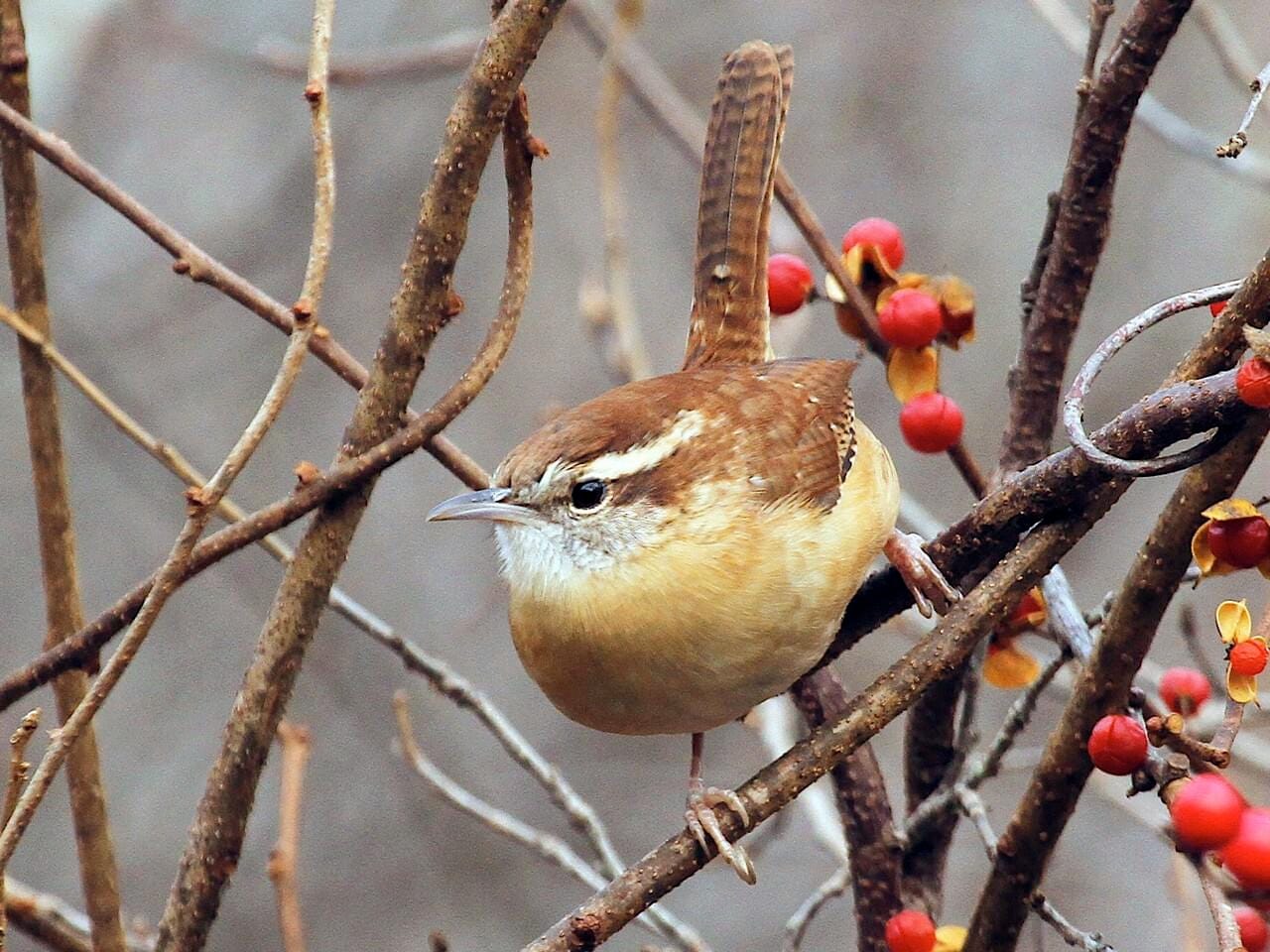There is a Carolina wren that bursts forth into song every morning here where we live in rural Louisiana. The bird is little, but its song is big. Such a mighty sound from such a tiny creature! I’m thrown every time. Its singing could reach the balcony, third tier, no problem. Have a listen to this YouTube video. You only need to watch the first thirty seconds to see, and hear, what I mean.
From bill tip to tail tip—as the great Roger Tory Peterson measured birds—the Carolina wren is 5 1/2 inches long. He calls it “a large wren”! Thryothorus ludovicianus, is the Linnaean classification. Dig this, from Wiki: “its specific name ludovicianus is a Latin term (derivative from Louis XIV) that means ‘of Louisiana’ that identifies the locality of the specimen collected near New Orleans.” Not far from where we are, near Lafayette, Louisiana, in the depths of French-speaking Cajun country.
Here’s how Peterson describes wrens in general, “Small, stumpy, energetic brown birds; slender, slightly decurved bills; tails often cocked.” Roger, Roger, Roger. Stumpy? With its tail jauntily pointed in a 45 degree angle upward—why do I find that so bloody attractive? Their range is fairly big, with a swath that includes the Mid-Atlantic states, all of the South, and even out to Oklahoma. According to Audubon.org, its conservation status is “probably stable, maybe even expanding.” God, it’s so nice to hear that once in a while.
It’s diet? Mostly insects. And listen to this, again from Audubon: “May mate for life. Pairs remain together all year, defending permanent territories.” Mate for life always sends a shot of sweetness through me.
This little Caruso makes me feel so good in the morning. It belts out its song, described by Peterson as “tea-kettle, tea-kettle, tea-kettle.” But that makes it sound silly. Did you watch the video? Tea-kettle? It’s simply music.
The Carolina wren in our bushes and trees is not only a great singer, but friendly. I would go so far as to say amiable. More than a few times I’ve seen him land and perch only a few feet away from me. (I know it’s a he, by the way, because only the males sing.) There’s something uplifting about a little bird that alights so near to you that you can almost touch it. It makes you feel that you’ve done something worthy to deserve this intimacy. The bird doesn’t fear you. It trusts you. (Can birds trust?) Ergo, you must be a good person. You’re trustworthy.
Sometimes I go into the woods near our home to pee, because what’s better than peeing outdoors? I will often see the little wren flying from branch to branch in the canopy above. I know it sees me. I brashly think it actually remembers me. Who knows? Maybe he does. I know I’m glad to see him.
The songs of birds always make me feel optimistic, particularly in the morning. The Carolina wren’s song, especially so. The day looks bright and full of possibility after I hear its full-throated song. As they say down this way, “Merci, mon très petit oiseau.”







I love this. For me, memories of mornings on Cumberland Island. That sweet song, far better than an alarm clock.
Marilyn
Poetic and informative, Richard. I enjoyed reading about your Carolina Wren. Merci d'avoir chanté les louanges de ce petit oiseau bien étonnant (je suis certain qu'il te reconnaît dans la forêt).
Given its latin name, you could have called him your Louisiana Wren. I had to look him up on the French page of Wikipedia. They refer to Carolina Wrens as Troglodyte de Caroline. Of course this immediately took me back to my only encounter with the Troglodyte people in Montesquieu's Lettres persanes:
LETTRE XI.
USBEK À MIRZA.
À Ispahan.
...Il y avoit en Arabie un petit peuple, appelé Troglodyte, qui descendoit de ces anciens Troglodytes qui, si nous en croyons les historiens, ressembloient plus à des bêtes qu’à des hommes. Ceux-ci n’étoient point si contrefaits, ils n’étoient point velus comme des ours, ils ne siffloient point, ils avoient des yeux ; mais ils étoient si méchants et si féroces, qu’il n’y avoit parmi eux aucun principe d’équité ni de justice.
Ils avoient un roi d’une origine étrangère, qui, voulant corriger la méchanceté de leur naturel, les traitoit sévèrement ; mais ils conjurèrent contre lui, le tuèrent, et exterminèrent toute la famille royale.
Le coup étant fait, ils s’assemblèrent pour choisir un gouvernement ; et, après bien des dissensions, ils créèrent des magistrats. Mais à peine les eurent-ils élus, qu’ils leur devinrent insupportables ; et ils les massacrèrent encore.
Ce peuple, libre de ce nouveau joug, ne consulta plus que son naturel sauvage. Tous les particuliers convinrent qu’ils n’obéiroient plus à personne ; que chacun veilleroit uniquement à ses intérêts, sans consulter ceux des autres...